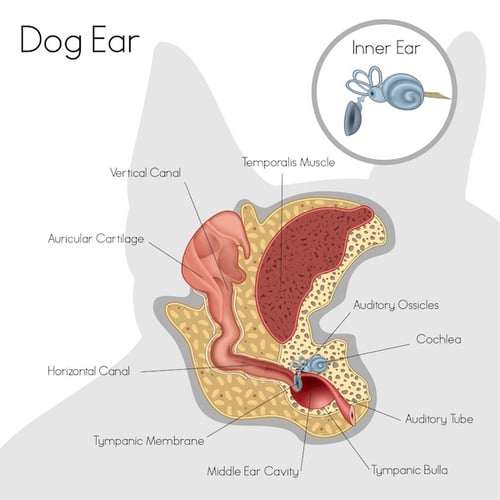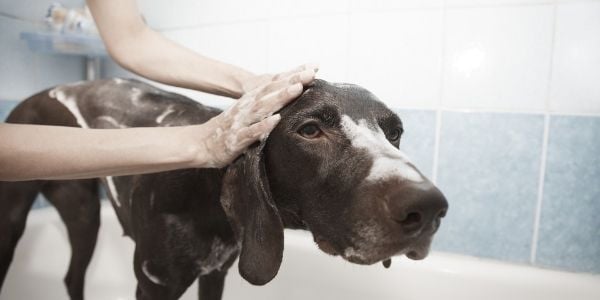
Them ears, them ears, them wonderful floppy ol’ ears!
I mean, who doesn’t just love dog ears?
On average, dogs have 18 muscles in each ear. The muscles help them to raise and lower their ears as well as rotate and tilt them.
Those wonderful ears allow dogs to be so expressive, and they help us understand, well, sorta, what they may be thinking by how they hold them.
Those ears can also tell you a lot of times when your dog may be suffering with an ear infection. You may notice your dog is holding their ears back more than normal. This is their way of saying, “I hurt” or “I am afraid and don’t want you to hurt my ears further.” They may tilt their head to one side, rub or paw at their ear(s), or shake them, which tells you something is wrong. Then there are those dogs who are just stoic and seem to communicate nothing with their ears even when there is an issue.
Ear infections are one of the most common reasons why people have to bring their dogs to the vet. In fact, 7.5% to 16.5% of cases seen in general practice are due to ear infections.
Skip to section:
When Are Ear Infections More Common?
Ear infections tend to happen most often in the summer when dogs are more likely to be swimming and getting baths – both high-risk opportunities for dogs to get water in their ears!
Dogs with seasonal allergies tend to get them around the same season each year, such as spring or fall.
For those poor dogs with food intolerances and non-seasonal allergies (such as those to dust, dust mites, and mold), the whole year seems to be fair game.
The shape of a dog’s ear canal is what makes them vulnerable to infections.

Your Dog’s Ear and Infections
The shape of a dog’s ear canal is what makes them vulnerable to infections. As opposed to our short and only mildly curved ear canal, the ear canal of dogs is shaped like a narrow, long “L.” Deep in the canal can become moist and humid, leading to infection.

Dogs with floppy ears are even more prone to infections since more moisture, a common cause of ear infections, tends to get trapped in the ear canal.
Additionally, a study also showed that some dog breeds are more prone than others to develop ear infections. Such breeds included:
- Bassett Hound
- Chinese Shar Pei
- Labradoodle
- Beagle
- Golden Retriever
- Poodle
- Cockapoo
- Spaniel types
Causes and Symptoms of Ear Infections in Dogs
Ear infections can affect one or both ears, and they can be caused by:
- Bacteria
- Yeast
- Mites (more common cause in puppies than adult dogs)
- Foreign objects lodged in the ear (e.g., grass seeds, bugs, burrs)
- Tumors or polyps
- Trauma (like a scratch inside the ear that becomes infected)
Just like us, a dog's ear canal naturally has low numbers of yeast and bacteria in it, but they remain ‘in check’ by the immune system. But when the ears become moist, inflamed, or there is a breakdown in the lining of the ear canal, the yeast and bacteria multiply, and the immune system becomes overwhelmed and unable to control them. The result is an ear infection.
As you may have picked up, a recurring theme in the development of ear infections is increased moisture and inflammation, regardless of the cause. So, in order to prevent or lessen the frequency of ear infections for pets, moisture and inflammation need to be managed in the ear canal.
One thing that is critically important to dealing with ear infections, especially ones that keep on happening over and over, is to address any underlying medical issues, such as thyroid issues, environmental allergies or food allergies/intolerances. All of these can lead to inflammation in the ears.
Medications and routine blood work are effective in controlling thyroid issues that may be the cause of ear infections.
Environmental allergies (atopic dermatitis) and food allergies or intolerances can be quite a bit more challenging and frustrating to manage. Understanding these conditions and how to best manage them can go a long way in helping lessen the frequency of ear infections.
Symptoms of Ear Infections
- Foul odor
- Redness
- Swelling of the pinna (the floppy outer part of the ear)
- Discharge that is either brownish or yellowish
-
Avoiding being pet on the face/head/neck
- Whining
-
Growling, snapping, or biting when being pet on face/head/neck or when someone reaches toward their head
-
Excessive shaking of the head or head "jolts" or tilting
-
Excessive itching of ear(s), even scratching at neck area
- Rubbing head/ears on objects or the ground
- Hot spot in the region of the ear
-
Unresponsive to verbal cues/hearing loss
- No noticeable symptoms, as the infection could be deep inside the ear and only detectable by a veterinarian
When Should You Take Your Dog to the Veterinarian for an Ear Infection?
If you’re getting a lot of discolored discharge from your dog’s ears or they act painful when cleaning them, it’s time for a trip to your vet. Oftentimes, this indicates that an infection is already starting to take hold, and getting your vet involved sooner rather than later is definitely in your dog’s best interest, and it’s in yours, too!
Remember, ear infections get a lot more painful and a lot more expensive to treat the longer they’re left to linger.
May I suggest…
If your dog is found to have an infection, I would recommend you request that the veterinarian give your dog’s ears a thorough initial cleaning. I recommend this for two reasons.
First, removing as much debris as possible allows for the medications to work better and likely heal faster.
Second, the initial cleaning, especially if there is a lot of discharge, may require the opening of the ear canal to be ‘wiped’ with a gauze pad or cotton wipe. Using Q-Tips® or wipes in the ear canal isn't recommended since they can cause abrasions and irritation, which leads to an infection. In the case of a newly diagnosed infection that is to be treated, you don’t have to worry about this issue, and the staff knows how to properly use wipes or gauze in the ear in order not to cause more harm.
Third, if your dog is in pain, they may not let you properly clean their ears, so the veterinary staff is skilled at getting in and out as quickly as possible, and they take precautions not to get bit.
How to Prevent Ear Infections for Your Dog
Once you have addressed any underlying medical causes, a simple and highly effective way to prevent and manage ear infections is to clean them with a gentle ear cleaner that contains a drying agent (and, in some cases, has antimicrobial properties) on a routine basis. But be sure not to clean overzealously (too frequently or aggressively), as this can cause more harm than good.
Ear cleaning not only removes excess wax and debris that can cause inflammation, but it also helps ‘dry out’ the ear canal so that yeast and bacteria don’t have an environment to thrive in. As mentioned, increased growth of yeast and/or bacteria will irritate and inflame your dog’s ears, starting a vicious cycle that will make the infection and pain even worse.
Aim to clean your dog's ears once or twice a week.
To prevent ear infections in dogs that don’t tend to get them, just be sure to always clean their ears after baths or swimming. Additionally, when the weather turns hot and humid, dogs often benefit from ear cleanings weekly to twice a month. For other times, regular maintenance can be done once every month or two.
MYTH: Perky, non-floppy-eared dogs don't suffer from infections is not really true. While they may have additional air-flow because their eats don't droop, because of the L-shaped ear canal, moisture can still get trapped.
Make Sure You Use the Right Ear Cleaner
You don't want to just grab any old ear cleaner, and you certainly don’t want to reach for the bottle of rubbing alcohol!
Unfortunately, some ear cleaners aren't very effective, and some don't help to dry your dog's ears.
Ingredients like rubbing alcohol and witch hazel, though they can help the drying process, can be extremely irritating and painful, especially if your dog's ears are already red or cracked.
There are several good ear cleaners/dryers out there for routine cleaning. Here are a few that you can easily pick up online or at your vet's office, and they're good to use on dogs and cats.
Vetoquinol Ear Cleansing Solution
Virbac Epi-Otic Advanced Ear Cleaner
Dechras EpiKlean Ear Cleanser
Otiderm Ear Cleansing Solution
Vetnique's Oticbliss Advanced Cleaning Ear Flush
Check out our article for more information and instructions on HOW to clean your dog’s ears. And then check out this article to learn when NOT to clean your dog's ears.

Preventing Ear Infections Is the Best Medicine
Rinse with caution. You can help your dog by never dumping a cup or pitcher of water over their head to rinse off shampoo or spraying their head with the shower nozzle or an outdoor hose. Regardless of how careful you think you might be, it’s a sure-fire way to get water in their ears! Decrease the risk by washing and rinsing their head with just a damp washcloth or sponge.
Use an ear cleaner with a drying agent (like the ones we list above) after you bathe your dog.
"Dry" ears after swimming. Of course, it's tough to prevent water from getting in your dog's ears when they're swimming. It's not like they're going to be excited about wearing a swimcap!
Like after bathing, put ear cleaner/drying solution in your dog's ears. Fill the ear canal till overflowing, and then gently massage. That’s it! No need to put anything into the ear or wipe it out.
Address environmental allergies. If your dog has been identified with environmental issues, try some of these options to help decrease ear infections:
- Use air purifiers throughout your home.
- Keeps windows closed when the pollen is coloring the world.
- Use dust mite covers on pillows and bedding (theirs and yours!).
- Vacuum and dust daily.
- After any trips outdoors, wipe your dog’s paws and body with a clean cloth or pet wipes, such as Furbliss, to remove allergens or pollen.
- Regularly wash their bedding in fragrance-free, pet-safe laundry detergent.
- Clean the ears once to twice weekly with a gentle ear cleaner that has a drying agent.
- Discuss with your veterinarian to see if supplements, such as omega-3 fatty acids or probiotics, may benefit your dog.
- Discuss with your veterinarian if they think Immunotherapy would be a good option for your dog.

Finnegan, in the photo above, recently had an allergy test; that patch on his side was where he was tested. Below are his allergy test results. He's a Preventive Vet team member's dog, who has been suffering from chronic ear inflammation. His ears were sore, but there was little to no bacteria or yeast in his ears. It's now clear that his flare-ups were solely due to his allergies. On a scale of 1 to 4, he is reactive to almost everything, both seasonal and everyday triggers, like dust mites and molds naturally occurring in houseplants. The best thing for Finn is to start Immunotherapy, which he is, but his ears still need to be kept clean on a regular basis.

Believe me when I say I know how frustrating ear infections can be to treat and manage. But, by establishing a good ear cleaning routine and taking steps to avoid inflammation and irritation to the ear canal, you can decrease the frequency of ear infections for your dog and the frustration of it all for you!







